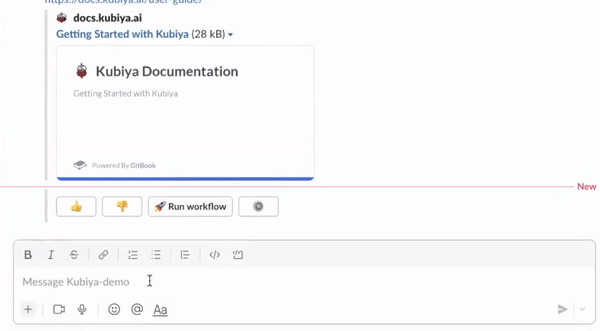 AI
AI
 AI
AI
 AI
AI
Kubiya Inc., a startup that bills itself as “ChatGPT for DevOps,” today announced the official launch of what it says is the first artificial intelligence assistant for engineering platforms and knowledge management.
The Kubiya tool is designed to make life easier for DevOps engineers, the people responsible for leading and coordinating the activities of different teams to create and maintain a company’s software. The term “DevOps” is a portmanteau of “development operations” and is a practice that aims at automating all steps of software construction.
Kubiya is a headless internal developer platform that lives within collaboration tools such as Slack and Teams or a command line interface. It has the ability to provision resources, trigger continuous integration/continuous development Jobs, Kubernetes deployments, cloud cost usage reports and other DevOps functions through simple user commands.
Chief Executive Amit Eyal Govrin told SiliconANGLE that DevOps and platform engineers are very often overwhelmed with repetitive developer and end-user requests for things such as infrastructure provisioning, access, workflows and approvals. “Our ability to alleviate this toll by enabling self-service requests in natural language over chat platforms like Slack and Teams is the ultimate enabler for DevOps engineer’s productivity,” he said.
Through its ChatGPT-like experience, Kubiya simplifies access to DevOps functions and responds to questions using knowledge sourced from databases such as Notion Confluence and other technical documentation. Users can interact with Kubiya using everyday language, with the company claiming that complex tasks can be transformed into “easy conversations.” It helps engineers to create and manage automations, workflows and perform other DevOps tasks far more quickly than they can when using traditional tools, the company said.
“Kubiya can significantly reduce the time it takes to adopt and maintain complex systems, such as an internal developer platform,” Govrin explained. For instance, an engineer can ask Kubiya in natural language how to create a new workflow. Because Kubiya has been trained on the customer’s internal documentation and other knowledge bases, it will deliver a concise response immediately in Slack of Teams.
“It’s really a DevOps force multiplier,” Govrin said. “It saves users time as there’s no need to go through outdated Wikis and links to read all of the details. It also saves on the aggravation of constantly replying to repeating questions. You can have Kubiya orchestrate ChatGPT to describe a resource of workflow so that the entire experience is seamless for end users.”
Govrin said Kubiya can be compared to GitHub Inc.’s Copilot, an AI-powered programming tool that helps developers to write code faster. It further boosts the productivity of DevOps engineers by learning to understand their needs, so it can provide useful recommendations about their day-to-day operations. This self-learning ability, known as “behavioral AI,” allows Kubiya to adapt to new scenarios based on user-specific data and feedback.
What’s more, it can be easily integrated into existing DevOps platforms, ensuring an almost immediate impact for new users, the company said. It’s really a “cheat code” for operational efficiency for DevOps teams, Govrin added.
Constellation Research Inc. Vice President and Principal Analyst Andy Thurai said with all of the advances in generative AI and large language models lately, it’s only a matter of time before the technology becomes commonplace in areas such as DevOps, IT operations and cloud operations. According to him, Kubiya can be especially useful for companies with multicloud application environments.
“Even the most skilled DevOps engineers are probably more experienced with one cloud than another, which raises challenges when they need to deploy an app on a different cloud infrastructure,” Thurai said. “Generative AI tools like Kubiya will be a big help in getting them started.”
Thurai did, however, warn that companies must be cautious about throwing in their lot with generative AI, citing research that shows code generated by LLMs is not always the most secure. There are also issues with LLMs creating invalid code, he said.
“Ultimately, the value of AI-generated infrastructure-as-code will depend on how much time humans have to spend correcting its inconsistencies and vulnerabilities,” Thurai said. “Complex code might be difficult for AI to create unless it has specific experience of writing it before. And then you must have humans in the loop to validate that code, which can chew up productivity gains.”
Still, Thurai said generative AI for DevOps and CloudOps is an area of progress, with many companies working to advance the concept and cash in on it. They include Kubiya, Pulumi Inc. and public cloud giants like Amazon Web Services Inc., Google Cloud and Microsoft Corp.
Despite Thurai’s caution, Kubiya claims to have had a big impact thus far. One of its earliest adopters is DevInfra Inc., creator of the DevZero developer environment. Debosmit Ray, CEO of DevInfra, said his team has benefited from significant productivity gains as a result of using Kubiya.
“Permissions and running various DevOps workflows consumed a lot of our engineering cycles,” Ray explained. “Implementing Kubiya reduced this time significantly, and cut it down by half.”
Support our open free content by sharing and engaging with our content and community.
Where Technology Leaders Connect, Share Intelligence & Create Opportunities
SiliconANGLE Media is a recognized leader in digital media innovation serving innovative audiences and brands, bringing together cutting-edge technology, influential content, strategic insights and real-time audience engagement. As the parent company of SiliconANGLE, theCUBE Network, theCUBE Research, CUBE365, theCUBE AI and theCUBE SuperStudios — such as those established in Silicon Valley and the New York Stock Exchange (NYSE) — SiliconANGLE Media operates at the intersection of media, technology, and AI. .
Founded by tech visionaries John Furrier and Dave Vellante, SiliconANGLE Media has built a powerful ecosystem of industry-leading digital media brands, with a reach of 15+ million elite tech professionals. The company’s new, proprietary theCUBE AI Video cloud is breaking ground in audience interaction, leveraging theCUBEai.com neural network to help technology companies make data-driven decisions and stay at the forefront of industry conversations.